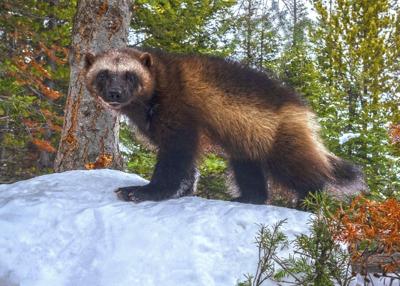The bill holds particular significance for Rep. Tisha Mauro, D-Pueblo, whose father, a former Colorado Parks and Wildlife employee, advocated for the reintroduction of wolverines during its initial consideration.
Her co-sponsor in the House, Rep. Barbara McLachlan, D-Durango, said she looks at the reintroduction as a "balance of nature".
"They used to be here for a very long time and then, with trapping and shooting and all this stuff, they went away, and they belong here," McLachlan said. "They're native species to Colorado, and I look forward to getting them back here."
"We just have to make sure that people know they're not wolves," McLachlan said.
Unlike the legislation proposed for wolverine reintroduction, the decision to bring gray wolves to Colorado was made through a ballot measure backed by urban voters against the wishes of residents in the areas where the wolves would be released into. Supporters of the reintroduction program insisted that the wolves would "restore balance to our state’s ecosystems.”
Soon after a judge denied a temporary restraining order sought by farmers and ranchers hoping to delay the reintroduction over fears the animals would harm their livestock, Colorado officers brought wolves in from Oregon and released them into the wild last December.
Even before the release of the Oregon wolves, several ranchers in areas like Jackson County have reported the loss of livestock to wolf predation.
Don Gittleson, whose ranch lies some 200 miles north of Denver, has been at the epicenter of the depredation debate in Colorado since wolves found their way here in 2020. So far, Gittleson said seven of his animals — including one bull calf — have either been killed or injured by a pack that migrated from Wyoming into northwestern Colorado.
Gittleson's experience epitomizes the worst fears among Colorado's ranchers — that, as wolves begin to make the valleys, lakes and peaks of the north-central Rocky Mountains their new home, depredation will intensify.
Colorado's lawmakers have expressed displeasure with the wolves' reintroduction. In January, they grilled officials from the Department of Natural Resources and Colorado Parks and Wildlife. The lawmakers said the state mishandled communications over the release and added that destroyed trust with ranchers and landowners. They added those ranchers and landers are now saying they will no longer work with the agency on conservation issues.
Lawmakers also hammered agency representatives over their refusal to come up with a definition of "chronic depredation" that would allow a Jackson County rancher to deal with two wolves — unrelated to the released wolves — that have killed 16 livestock and four working cattle dogs.
Dan Gibbs, chief of the Department of Natural Resources, apologized for the communication failures.
One of the staunchest critics of the wolf introduction, Sen. Dylan Roberts, D- Frisco, also happens to be a sponsor of the wolverine bill. He outlined two crucial distinctions between the proposed legislation and what happened with the wolves.
"Wolverines themselves are not a major threat to agriculture or to any community at all." he said. "They prey mostly on dead animals and they don't interact with livestock. They live at such high altitude that it will be rare for anybody to ever see a wolverine."
"Wolves, obviously, prey on large animals and have a history of depredation of livestock, and that is not the case with wolverines," he said.
Also unlike the wolf reintroduction, the bill includes a provision for compensating owners of livestock affected by wolverines.
However, Roberts reiterated, the likelihood of a wolverine causing any harm to livestock would be extremely rare, noting that there have only been two confirmed cases of livestock being killed by wolverines in the country in the last 40 years.
The bill, whose sponsors include Sen. Perry Will, R-New Castle, will be heard by the Senate Agricultural & Natural Resources Committee on Thursday at 1:30 p.m.


(0) comments
Welcome to the discussion.
Log In
Post a comment as Guest
Keep it Clean. Please avoid obscene, vulgar, lewd, racist or sexually-oriented language.
PLEASE TURN OFF YOUR CAPS LOCK.
Don't Threaten. Threats of harming another person will not be tolerated.
Be Truthful. Don't knowingly lie about anyone or anything.
Be Nice. No racism, sexism or any sort of -ism that is degrading to another person.
Be Proactive. Use the 'Report' link on each comment to let us know of abusive posts.
Share with Us. We'd love to hear eyewitness accounts, the history behind an article.